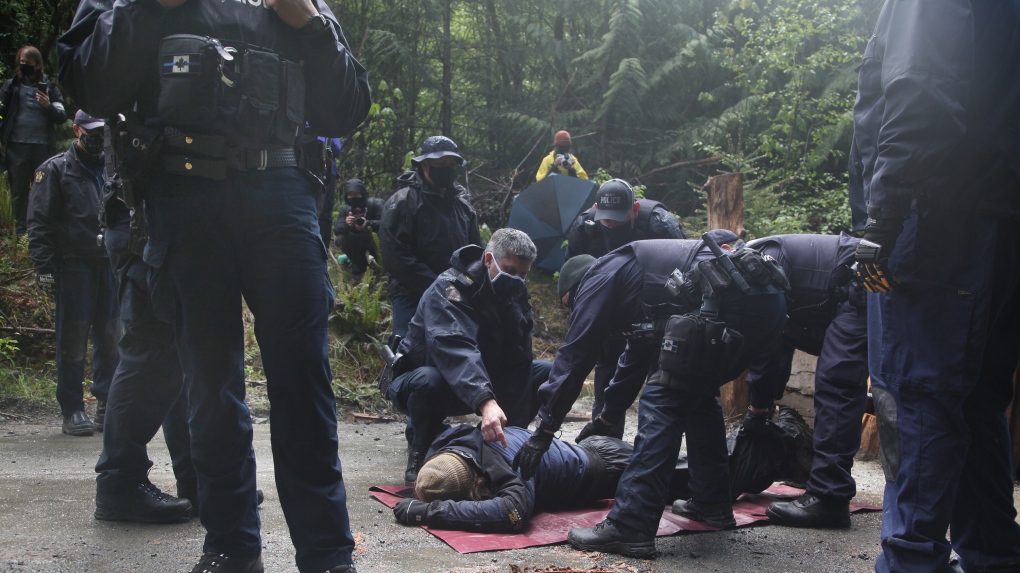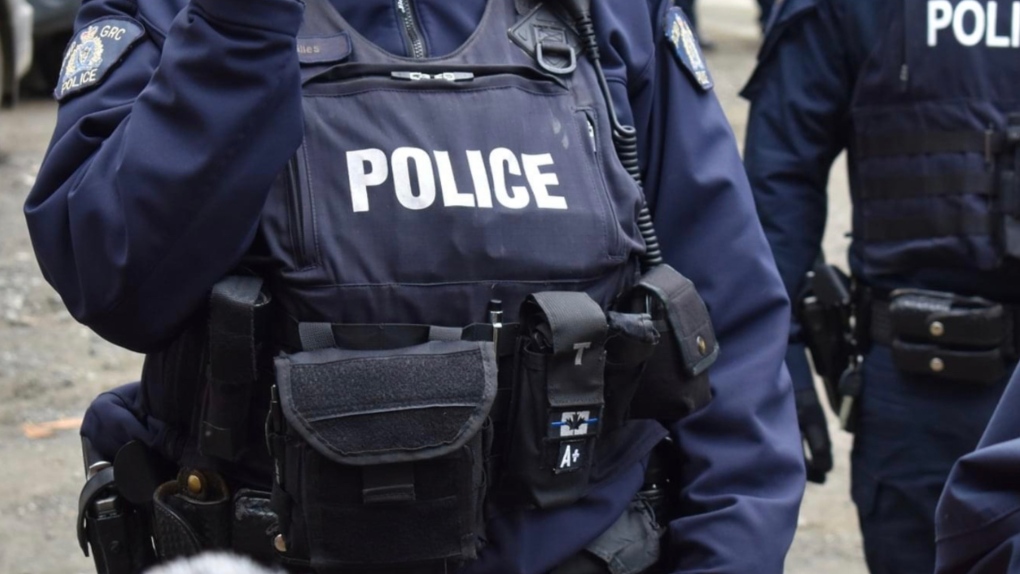RCMP enforcement at B.C. logging protests 'unreasonable,' federal police watchdog says
A federal police oversight agency has found the RCMP's enforcement of a civil injunction against old-growth logging protesters on Vancouver Island was unreasonable and violated the rights of activists.
The Ottawa-based Civilian Review and Complaints Commission on Wednesday published a summary of its final report into the RCMP's handling of the protests in the Fairy Creek watershed, which began in 2020.
The CRCC investigation found the protest exclusion zones and checkpoints used by members of the RCMP’s Community-Industry Response Group (C-IRG) were unreasonable, and the decisions by officers to remove their name tags and, in some cases, don "Thin Blue Line" patches broke RCMP policy.
Timber company Teal Cedar Products Ltd. won an injunction in April 2021 prohibiting protesters from obstructing its forestry operations in the watershed, approximately 120 kilometres west of Victoria.
Over the ensuing months, more than 1,100 people would be arrested in the protest exclusion zone, including many who were arrested more than once.
The C-IRG, a specialized unit that is tasked with policing protests against industry and resource-extraction infrastructure in B.C., detained at least person without cause on a public road after he refused to submit to a search, which itself was baseless, the police watchdog found.
"The review determined that the RCMP’s demand to search the complainant at a checkpoint on a public road was unfounded, and his arrest, after refusing to agree to the search, was groundless," the summary said.
Video recording of arrest
The RCMP had already conducted its own investigation into the arrest of the man – who identified himself as a hiker on a public road – and determined the search and arrest were lawful, and also concluded its officers did not have to wear name tags identifying themselves. The man then filed a complaint with CRCC, which ultimately ruled in his favour.
"The commission reviewed a video recording of the encounter and the arrest that had been made by one of the man's friends," the investigation summary said.
"The recording showed that the RCMP members told the group that they would need to provide photo identification and agree to searches of their bags before they could go any further. The man asked the RCMP members whether this was legal, and he asked them to identify themselves. The RCMP members quickly read out their regimental numbers (sometimes called "badge numbers") but they would not repeat them when asked, and they refused to tell the group their names."
When the man declined to be searched, telling the police his constitutional rights were at stake, the officers arrested him.
The commission noted that warrantless searches are only lawful following an arrest – a so-called pat-down search for weapons to ensure officer safety – or if there is reason to believe the person has committed a crime.
Police may also conduct a search without a warrant if the subject provides informed and voluntary consent to be searched, or if the delay caused by obtaining a search warrant would endanger human life or safety, or result in the disappearance of evidence, the CRCC report said.
"The commission concluded that none of those exceptions applied here," according to the summary. "There was no evidence that there was a serious risk of violence or even that weapons were being brought into the exclusion zone –instead, the RCMP was worried about letting in any construction materials that some protesters could use to create more obstacles."
Thin Blue Line patch
The report also noted that one of the arresting officers wore a "Thin Blue Line" patch on his uniform, which the investigation found is a "divisive or even hateful" symbol that "has been widely rejected as an appropriate or permitted part of police uniforms in Canada – including by the RCMP."
"The commission found that the RCMP member acted unreasonably by wearing the 'Thin Blue Line' patch on his uniform," the summary said.
"Not only did he breach RCMP policy, as the RCMP concluded, but the video evidence showed that the RCMP member took a disrespectful and even hostile tone when the man questioned the presence of the patch on the RCMP member’s uniform when it was associated with white supremacist groups."
The CRCC, which is an agency of the federal government and is independent from the police, said RCMP Commissioner Mike Duheme agreed with the commission's findings that the RCMP acted unreasonably in its enforcement of the Fairy Creek injunction.
"The RCMP commissioner also supported the recommendation that an appropriate member of the RCMP should apologize to the man for the RCMP’s failure to give proper regard to his civil liberties by arresting him without grounds," the summary said.
Critical Response Unit
The commission said it continues to review the actions of the C-IRG, which rebranded in early 2024 after years of complaints from civil rights and Indigenous groups.
The renamed Critical Response Unit (CRU-BC) was also given a new mandate in January "to better reflect the scope of work and service that its members are called to," according to a statement on the unit's website.
The CRU-BC will "continue to assist in civil and public order events for natural or human caused disasters, conduct proactive engagement and, if required, enforcement duties specific to the critical incident," the statement says.
The Fairy Creek protests began after logging permits were granted in 2020 to allow Teal Cedar to cut timber, including old-growth trees, in areas that included the Fairy Creek watershed.
Protest camps were set up close to the cutting site in August 2020 and injunctions aimed at preventing interference with logging or forestry crews followed the next year.
Confrontations escalated in 2021, leading to active RCMP intervention and what is considered one of the largest acts of civil disobedience in Canadian history.
Must Watch
Top Videos
CTVNews.ca Top Stories

Justin Trudeau's set to go after the Liberals pick his replacement, what now?
Prime Minister Justin Trudeau, announcing Monday that he intends to resign as Liberal leader and prime minister as soon as his party names his replacement, has set a series of political machinations in motion.
3 hours ago
Justin Trudeau steps down as Liberal leader. Who are the top contenders to replace him?
With Prime Minister Justin Trudeau's resignation as Liberal party leader, several well-known political faces may be waiting in the wings for their opportunity to take his place.
'Together, what a great nation it would be': Donald Trump, Elon Musk react to Justin Trudeau's resignation
Amid news of Prime Minister Justin Trudeau's resignation as leader of the Liberal party on Monday morning, reactions from prominent figures began piling in.
Strong earthquake kills at least 95 people in western China near Mount Everest
A strong earthquake shook a high-altitude region of western China and areas of Nepal on Tuesday, damaging hundreds of houses, littering streets with rubble and killing at least 95 people in Tibet.
3 hours ago
Doug Ford snaps back at Donald Trump's Canada taunts with offer to 'buy Alaska'
Ontario Premier Doug Ford has snapped back at Donald Trump’s frequent taunts about treating Canada as a U.S. state with a counterproposal: buying Alaska.
Trudeau resignation: recap key moments, analysis, reaction as it happened
Prime Minister Justin Trudeau has stepped down as Liberal leader. Here's a recap of key moments, analysis, and reaction as it happened.
Trudeau says Parliament is 'prorogued' until March. What does that mean?
In his resignation speech on Monday, Prime Minister Justin Trudeau announced that Parliament would be prorogued until March, which will give the Liberal party time to find a new leader ahead of an expected confidence vote and early election.
Justin Trudeau resignation: Here's what he said in Ottawa today
Prime Minister Justin Trudeau delivered a speech about his political future Monday morning outside Rideau Cottage in Ottawa. Here's the message he delivered to Canadians.
Justin Trudeau is resigning after an historic political tenure, here's a look back at his career-defining moments
In a seismic political move, Justin Trudeau has announced his intention to step down as leader of the Liberal Party of Canada and prime minister, once his successor is named. This decision comes after more than nine years in the country's top job and nearly 12 years at the helm of his party.





































































